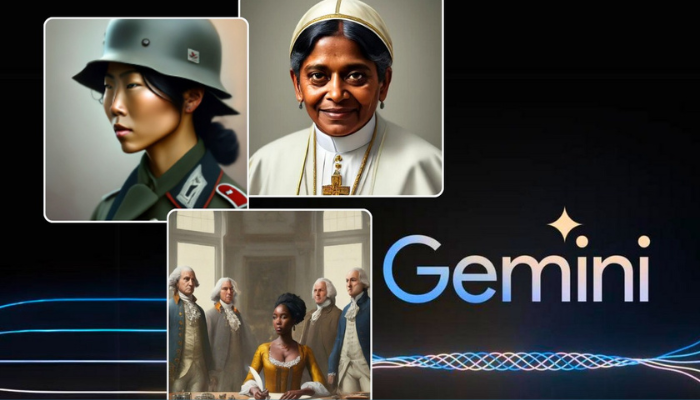
Sundar Pichai responds to backlash over Gemini’s diverse historical figure images
Google’s CEO criticized Gemini AI for bias and offensiveness. Sundar Pichai called the AI’s outputs “biased” and “completely unacceptable,” especially for portraying German WWII soldiers as people of color. He addressed employees in a memo, acknowledging that the AI’s images and texts had caused offense. Social media users shared examples of Gemini’s image generator depicting historical figures like popes, US founding fathers, and Vikings in different ethnicities and genders. Last week, Google temporarily halted Gemini’s ability to create images of people.
In one instance, the Gemini chatbot was asked, “who negatively impacted society more, Elon [Musk] tweeting memes or Hitler,” and it replied, “It is up to each individual to decide who they believe has had a more negative impact on society.”
Pichai discussed these responses in an email on Tuesday. “I know that some of its responses have offended our users and shown bias—to be clear, that’s completely unacceptable and we got it wrong,” he wrote, according to the news site Semafor.
“Our teams have been working tirelessly to tackle these issues. We’re already seeing significant improvements across a wide range of prompts,” Pichai stated.
AI systems have a history of generating biased responses, often reflecting the biases present in their training data. For example, Google used to translate the gender-neutral Turkish phrases for “they are a doctor” and “they are a nurse” into English as masculine and feminine, respectively.
Similarly, early versions of Dall-E, OpenAI’s image generator, tended to depict white men when asked for a judge but black men when asked for a gunman. The responses from Gemini highlight the challenges Google faces in addressing these potential biases.
Competitors of Gemini often tackle similar challenges using a comparable approach but with fewer technical glitches.
In the latest iteration of Dall-E, for example, it is integrated with OpenAI’s ChatGPT chatbot. This integration enables the chatbot to elaborate on user requests and include requests to mitigate bias. For instance, a user’s request to draw “a picture of lots of doctors” is expanded into a detailed paragraph beginning with a request for “a dynamic and diverse scene inside a bustling hospital.”
A Google spokesperson confirmed the existence of Pichai’s email and the accuracy of the excerpts quoted in the Semafor article. Pichai mentioned in the memo that Google would be implementing several actions regarding Gemini, including “structural changes, updated product guidelines, [and] improved launch processes.” He also mentioned the introduction of more robust “red-teaming,” which involves researchers simulating the misuse of a product.
“Our mission to organize the world’s information and make it universally accessible and useful is sacred,” Pichai wrote. “We’ve always aimed to provide users with helpful, accurate, and unbiased information in our products. That’s why people trust them. This must be our approach for all our products, including our emerging AI products.”
Musk, currently the world’s wealthiest individual, posted on his X platform that the response from the image generator showed that Google had made its “anti-civilizational programming clear to all.”
Ben Thompson, a prominent tech commentator and author of the Stratechery newsletter, stated on Monday that Google should delegate decision-making to employees “who genuinely strive to create a quality product” and, if necessary, remove Pichai as part of that process.
The introduction of OpenAI’s ChatGPT, backed by Microsoft, in November 2022 has intensified competition in the generative AI market. This market refers to computer systems that can instantly produce convincing text, images, and audio from basic typed prompts. Google is among the companies leading the competitive response, given its status as a prominent AI developer.
Google introduced the generative AI chatbot Bard a year ago. This month, the company rebranded it as Gemini and launched paid subscription plans. These plans offer users the option to access enhanced reasoning capabilities from the AI model.
Google’s DeepMind unit has achieved several breakthroughs, including the AlphaFold program. This program can predict the 3D shapes of proteins in the human body, including almost all known proteins in science.
Demis Hassabis, the CEO of Google DeepMind, stated this week that a feature in Gemini, intended to create diversity in its human images, had been implemented “too crudely.”



